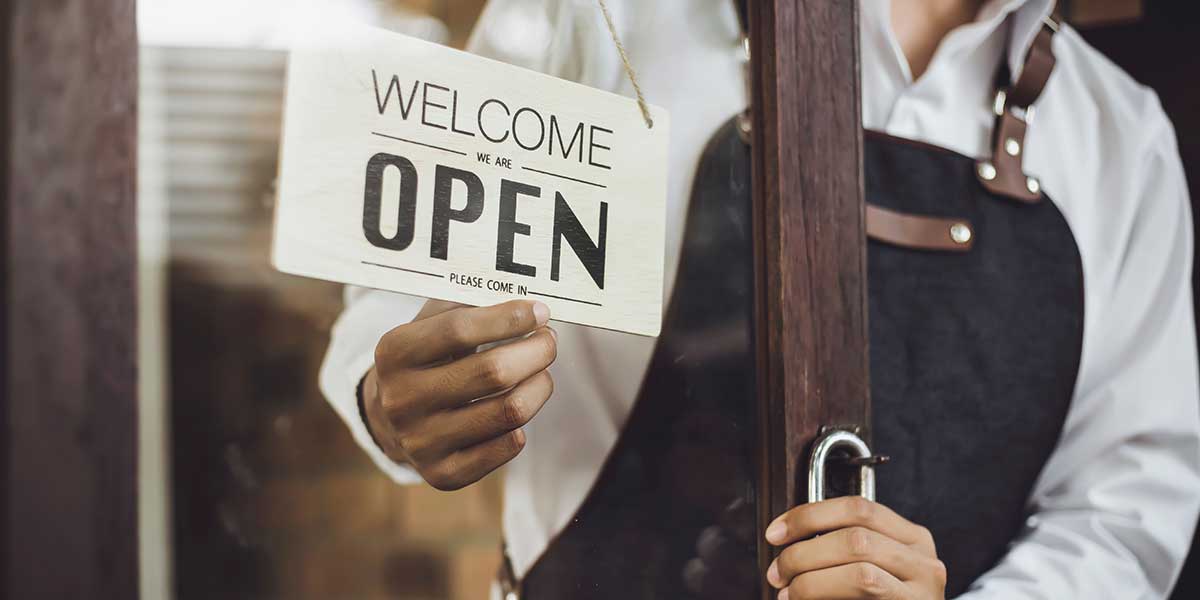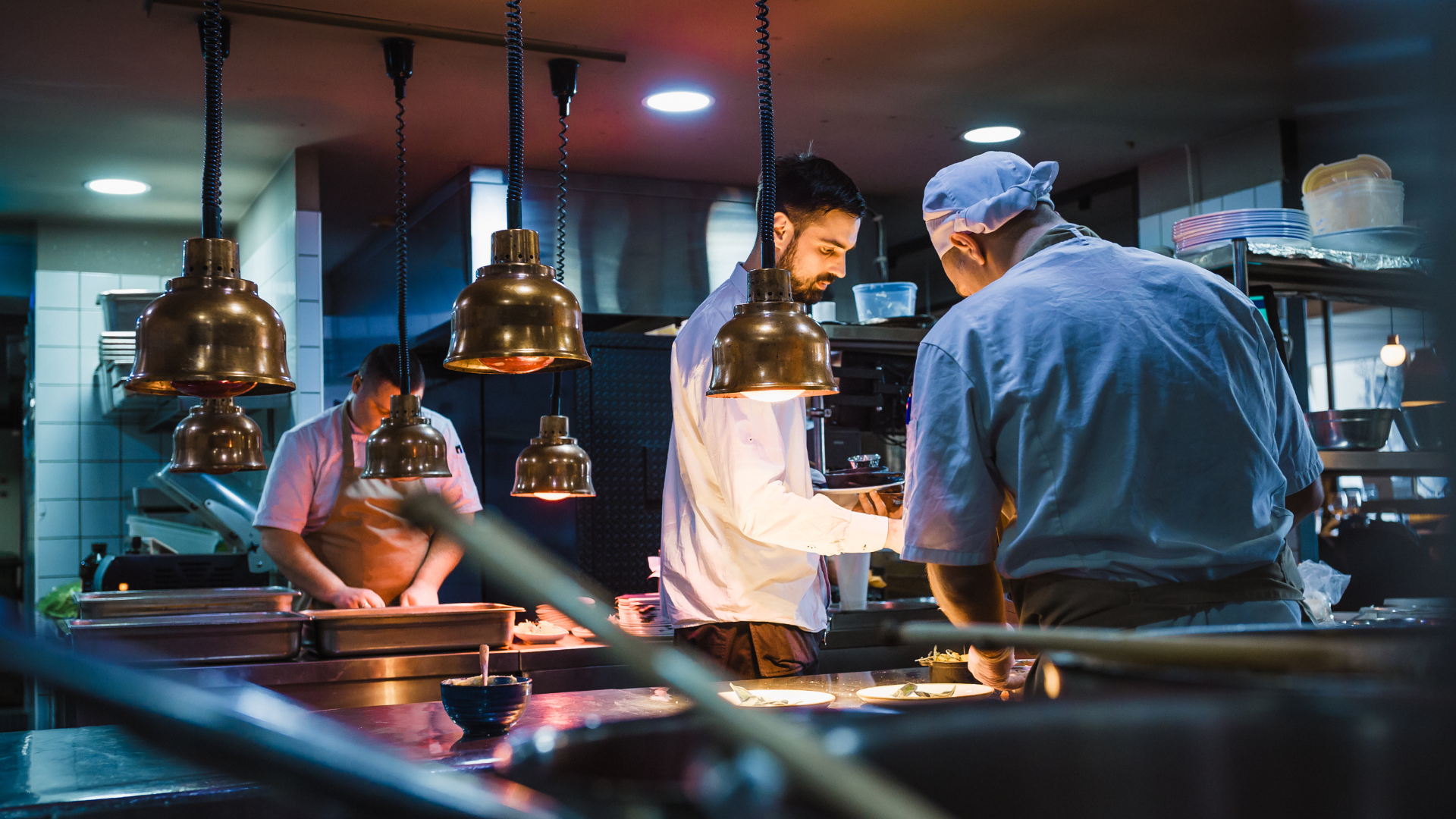If you've been dreaming of opening your restaurant for years, you'll be extremely excited when the time finally comes.
The legal requirements that come with opening a restaurant might not be the most thrilling part of your journey, but they're among the most important.
By ensuring you have a comprehensive understanding of the regulations you'll need to follow and the licences you'll need to acquire, you'll be on the right path for success in your hospitality business. That's why we've rounded up 14 key legal requirements for new restaurants in the UK to be aware of.
The information provided in this blog is for general informational and educational purposes only. It is not intended as, and should not be construed as, legal advice. While we strive to provide accurate and up-to-date information, the content may not reflect the most current legal developments and is not a substitute for professional legal counsel.
14 legal requirements to open a restaurant in the UK
Here are key legal areas for you to be aware of before the grand opening of your brand new restaurant.
Please note that this is a non-exhaustive overview of all the legal requirements that apply for new restaurants. Things also vary from one UK jurisdiction to another, so be sure to verify the rules in the place where your business operates.

Sole trader, partnership or company registration
When starting a restaurant business, one of the first things you'll need to do is decide on your business structure. This means deciding whether your business will be operated by yourself as a sole trader, in a partnership, or by a limited company you set up.
Being a sole trader means taking on more personal responsibility for your business and its liabilities. You also get to keep your profits after paying tax.
Alternatively, you can set up a partnership, where responsibilities and profits are shared between yourself and a partner. Your partner could be another person, or another entity such as a separate limited company.
Another option is to start a limited company. Limited companies are separate legal entities with limited liabilities. They are subject to different rules compared to sole traders in areas like taking money out of the company and taxation.
Once you've decided which structure is right for you, you can register on the GOV.UK website.
Food business registration
Restaurants must register as food businesses. Food business registration must be done with your local authority here.
You should register as a food business at least 28 days before you start trading. The Food Standards Agency provides further guidance to help prepare for food business registration. While many of these steps are not legal requirements, they are helpful tips for getting your restaurant started:
- Creating a restaurant business plan.
- Setting up food safety procedures well in advance of opening your business.
- Ensuring your premises are properly set up to run a food business. This includes ensuring that they are in good repair and condition.
- Following allergen regulations.
Taxation requirements
Before you begin operating a restaurant, it's crucial that you have a strong understanding of the taxation requirements for your business. Some key taxes to be aware of are:
- Income tax: For sole traders and partnerships, income tax must be paid on a restaurant's profits at progressive rates of 20-45%, depending on the amount of profit.
- Corporation tax: For limited companies, corporation tax is paid on your venue's profits. See a complete overview of corporation tax rates here.
- Value added tax (VAT): VAT is a tax added to products and services sold by certain businesses. If your restaurant business turnover exceeds £85,000 in a 12-month period, you will need to register for VAT. This means you generally won't need to be too concerned about VAT when first starting your business. However, it's an important tax to keep in mind for the future. Find out more about the current UK regulations for VAT in restaurants here.
- Business rates: Business rates are paid on buildings used for non-domestic purposes. Bills for business rates are sent in February or March each year, covering the coming year.
- National Insurance Contributions (NICs): If your restaurant has employees, you must pay NICs on their earnings, unless they are subject to category exemptions. See the current National Insurance Contribution rates on the GOV.UK website.
To make sure you have a handle on all of your taxation obligations from the get-go, ensure you are keeping proper records of income, expenses and payroll in your business. Consult with a tax expert so you have the right systems in place as soon as your business begins.
Employment law
When hiring employees for your restaurant, you need to have a comprehensive understanding of everything that goes into legal compliance. Here are just a few areas to focus on when it comes to employment law:
- Right to work: Before employing someone, make sure they have the proper employment permissions in your jurisdiction.
- Contracts: Ensure all your employees have legally compliant contracts. Make sure to involve a legal expert when first creating employment contracts in your business. Contracts must set out things like pay, holiday entitlement, and working hours.
- Pay As You Earn (PAYE): Typically, you'll have to operate a PAYE program in your business. This is the HMRC (His Majesty's Revenue and Customs) system for collecting income tax and National Insurance from employment.
- Equality: Under the Equality Act 2010, you must not treat your employees "less favourably" because of factors like age, race, sex, or religion. Make sure you understand this legislation and how to follow it in your business.
- Harassment: The Equality Act 2010 also makes harassment unlawful. You must have grievance procedures in place to address harassment in your business.
- Working hours: There are several regulations in place addressing employee working hours. Employees generally cannot work more than 48 hours a week on average, usually over the course of 17 weeks. Employees must also be properly compensated for all hours they work.
You can use reliable software such as Rotaready to effectively record your employees' working hours and track their compensation. By integrating Rotaready with ResDiary, you can more effectively plan shifts with a full overview of booking data.
Health and safety regulations
A restaurant has many obligations as outlined by health and safety regulations in the UK. Among the most important is food safety. Here are some of the most important rules to follow when it comes to food safety in a restaurant:
- Food must be safe to eat: All food you serve in your restaurant must be safe to eat. To ensure this is the case, you must abide by hygiene requirements, avoid cross-contamination and closely monitor expiry dates.
- Traceability: You must maintain records of where all of your inventory and food stock came from. You must be able to show this information on demand.
- Unsafe food: If unsafe food is served to customers, it and any other unsafe food must be withdrawn as quickly as possible. You must also complete an incident report.
- Allergen management: In the UK, 14 key allergens must be declared when they are present in your food. This information is best presented on your menu, and at a minimum must be available when requested, typically through your allergen matrix. There are other steps you can take for proper allergen management, such as cleaning utensils before each use, regularly washing your hands and avoiding cross-contamination.
You have other health and safety obligations to abide by, aside from food safety. These include the proper usage of electrical equipment, preventing slips, trips and falls, and complying with ergonomics guidelines.
Complying with all these legal obligations can feel overwhelming. Tools like Trail help to simplify these tasks. For example, Trail has a wide range of digital checklists, helping to prove your compliance with these obligations.

Fire safety
Fire safety is among the most significant legal obligations for a restaurant. If you fail to meet your fire safety obligations, you can face an unlimited fine and even time in prison.
In England and Wales, fire safety is governed by the Regulatory Reform (Fire Safety) Order 2005.
Under the order, business owners must complete (or oversee the completion of) a Fire Risk Assessment. This allows you to identify fire hazards in your business and find ways to remove or mitigate them. Fire Risk Assessments should be reviewed regularly.
You must also make an emergency plan. Emergency plans should include your fire detection system, a clear understanding of who calls 999, employee training and more.
Broadly similar regulations are in place in Scotland and Northern Ireland.
Environmental regulations
There are many different environmental regulations in place around the UK. Here are some of the regulations that may affect your new restaurant:
- Environmental Protection Act 1990: Under this nationwide legislation, businesses must ensure waste is stored, transported and disposed of properly. Restaurants have Duty of Care for waste, and must ensure it is handled by a licensed waste carrier.
- The Water Industry Act 1991: This Act regulates how businesses dispose of fats, oils, and grease. Restaurants must install grease traps and avoid pouring oil down drains.
- Single-Use Plastics Ban (England): In England, single-use plastic drink stirrers and cutlery items are banned. Food and drink containers made of expanded and extruded polystyrene are also banned.
- Waste (England and Wales) Regulations 2011: These regulations set out a waste hierarchy. This means that restaurants must, where possible, reduce, reuse, and recycle waste before resorting to sending it to landfill. The Waste Regulations (Northern Ireland) 2011 are fundamentally similar.
- Food Waste Regulations (Scotland) 2014: Under this regulation, businesses in Scotland producing over 5kg of food waste per week must separate and recycle it.
Environmental regulations in the UK are constantly evolving. Organisations such as the Sustainable Restaurant Association help to keep restaurant owners updated on the latest guidelines they need to follow. You can also check out our complete guide to restaurant sustainability for more environmental best practices.
Building and planning requirements
In England and Wales, the Town & Country Planning (Use Classes) Order 1987 is in place. Under this Order, all land and buildings are categorised into Use Classes.
Most restaurants are in the subclass A3. Your premises may already have A3 authorisation, in which case you don't need to make any planning changes.
If your premises do not have A3 authorisation, you must apply for a change of use. This is done through your local council.
If you are making changes to your premises, you will likely need building regulations approval. These regulations ensure that any changes made to your premises comply with standards like disabled access, fire safety and environmental protection.
If you need building regulations approval, you must apply for approval from your council, or private inspectors. Depending on the types of alterations you're making, this can be quite a lengthy process, so it's best to get started on it as early as possible.
Similar rules are in place, with some differences, in Scotland and Northern Ireland.
Accessibility
Under the Equality Act 2010, restaurants must make reasonable adjustments to accommodate people living with disabilities. You must be able to provide reasonable adjustments upon request. You also need to think ahead and provide adjustments that people living with disabilities are likely to request.
Some reasonable adjustments your restaurant may be required to make are:
- Providing ramps for wheelchair access.
- Having information available in alternative formats like braille or easy-read.
- Ensuring you have an accessible toilet.
Going through the process for building regulations approval also helps to ensure your restaurant is accessible for people living with disabilities.
Pavement licence
If you want to use the pavement outside your restaurant for seating, you need a pavement licence. You'll apply for this licence through your local authority, and you'll need to abide by the Business and Planning Act 2020 with your outdoor seating.
Local authorities may charge up to £500 for first-time applications.
Alcohol licences
To sell or supply alcohol in your business, you generally need a licence from your local council. Your restaurant requires two separate licences to legally supply alcohol.
A premises licence authorises your restaurant to sell and serve alcohol. A personal licence is required for a designated premises supervisor. The designated premises supervisor is responsible for overseeing the sale of alcohol in a business.
Premises licences are fairly simple to obtain from your local authority, provided you meet the requirements. You can often apply online, or otherwise via post.
To get a personal licence, you usually need a relevant licensing qualification. Once you have this qualification, you can apply for a licence from a local authority.
Music licence
Music can be a crucial part of the ambience of many venues. With TheMusicLicence, there's a simple process that allows you to play copyrighted music in your business.
Without a licence, you won’t be allowed to play the radio or any music within the business space, so it’s key to acquire one if you want to have curated background noise and create an atmosphere in your venue.
TheMusicLicence also allows you to host live music events. By acquiring this licence, you're able to host live entertainment events in your restaurant, helping to grow your business and attract more customers.
The cost of TheMusicLicence varies depending on the specific needs of your business.
If you plan to host live music, once you’ve got your licence you can take advantage of ResDiary partnerships with the likes of Tonic, to easily sell tickets to the event, and DesignMyNight, to promote it to their monthly audience of 3.9 million users.
Marketing regulations
Marketing is significantly regulated around the UK, and you'll need to think carefully about the information you convey when opening and operating your restaurant. For example:
- You cannot use false or deceptive messaging. An example of this might be knowingly claiming a promotion will end before it actually does.
- You cannot leave out important information. An example of this might be failing to mention a minimum spend required to claim a deal in your restaurant.
- You must comply with rules around business signage.
Customer data is a critical component of modern advertising. When using customer data, you must comply with regulations such as the UK General Data Protection Regulation and the Data Protection Act.
These regulations set out how you must handle your customer data. Some of the most important principles of these regulations are:
- Data must be used fairly, lawfully, and transparently.
- Data must be used for specified, explicit purposes.
- Data must be kept for no longer than is necessary.
Using ResDiary or integrations like Acteol for your marketing efforts? ResDiary and its integrations are compliant with UK data protection laws. All integrations are highly secure and contain the controls necessary to comply with the GDPR and the Data Protection Act.
That means you can make the best use of the information you gather about your customers while still following the law.
Keep in mind that using compliant software isn't the only requirement for following data protection laws. There are further steps your business needs to take to ensure customer data is handled properly.
For more information, see UK.GOV's guide to data protection for businesses.
Insurance requirements
As you start to build your restaurant business from the ground up, it's crucial to ensure you have the proper protections in place. That's where restaurant insurance comes in.
In the UK, employers are legally required to have employers' liability insurance. This insurance covers you for compensation claims that employees may make for injury or illness resulting from work they do for you.
You must get this insurance as soon as you become an employer. Also, your policy must cover you for at least £5m and come from an authorised insurer.
Employers’ liability insurance is typically the only legally mandated insurance for restaurants in the UK, unless you use a motor vehicle. If a motor vehicle is used in your business to deliver food, you are legally required to have business motor insurance, too.
There are other major forms of insurance you should strongly consider for your business. These insurance types may be required by parties like your landlord, or businesses you enter into contracts with. A few examples include:
- Public liability insurance: Public liability insurance can cover compensation for members of the public who are injured on your premises, as well as for associated legal fees. It can also cover damage to customer's property that occurs on your premises, for which you can be held responsible. Public liability insurance is sometimes made a legal requirement by local councils.
- Building and contents insurance: The owner of a building, whether that's you or a landlord, generally provides building insurance. Contents insurance covers the cost of replacing your restaurant's contents if they are damaged in events like fires or floods. Restaurant contents might include equipment and furniture.
- Product liability insurance: Product liability insurance can provide cover for claims resulting from food or drinks you serve in your venue. For example, if a customer becomes ill because of food you serve, product liability insurance can cover their compensation. It can also cover your associated legal fees.
Depending on your specific business, there are many other forms of insurance your restaurant might require. Consult with an insurance expert to ensure you have an adequate level of coverage.
Tips for opening a new restaurant business
Starting up a new restaurant presents plenty of challenges. Here are a few tips that can be a big help:
- Branding: Your restaurant's brand is its key distinguishing feature. You should establish your brand as thoroughly as possible before starting your new venture. For more information, check out our guides to restaurant branding and restaurant website design.

- Get the right table management system: Dealing with all the associated costs of opening a new restaurant isn't easy. The right tech stack can go a long way to helping out. ResDiary offers an intuitive and commission-free booking solution, keeping more money in your business's pocket. With tools like email marketing and an automated phone answering service, ResDiary helps you bring in more customers without ballooning your budget.
- Build your tech stack: There's plenty of software needed to launch a successful restaurant. You can use ResDiary as the lynchpin of your tech stack. Our integrations include tools for marketing, digital payments, ticketing, and more. For more information, check out our complete guide to essential tech tools for restaurants.
Get started on the right foot with ResDiary
ResDiary is the perfect table management system for your new business. Our commission-free structure means the money you earn from your customers stays in your pocket.
You can also integrate ResDiary with a range of leading marketing tools, EPOS solutions and more. You'll get more value for money with two-way data flow between ResDiary and these critical tools.
ResDiary takes a streamlined, intuitive approach to booking management. It's beginner-friendly, but has the advanced functionality to scale with your business.
Book a demo with ResDiary today and get ready to live your hospitality dreams.


.gif?width=440&height=440&name=DesignMyNight%20Website%20(3).gif)




